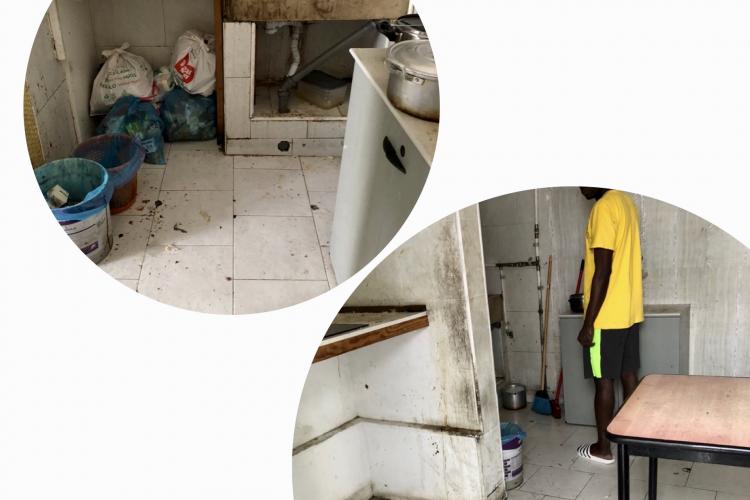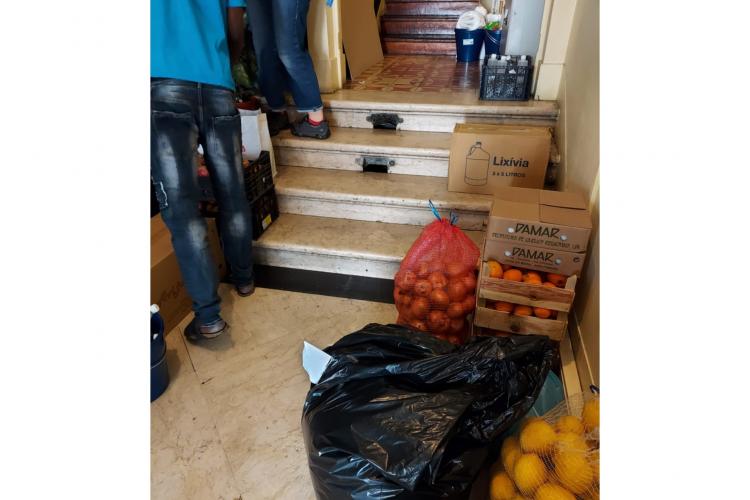Covid-19, The ‘Undercover’ Portuguese Asylum System, and Its Jerry-Riggings
Posted:
Time to read:
Guest Post by Cristina Santinho (Researcher at CRIA and Professor of Anthropology at ISCTE-IUL; Dora Rebelo (Psychologist and PhD candidate in Anthropology at ISCTE-IUL and CRIA); Silvia Cardoso (Anthropologist and PhD candidate in Geography at IGOT, Lisbon). The three researchers have been conducting fieldwork with refugees and asylum seekers in Portugal for about a decade. This post is part of our themed series on border control and Covid-19.
The unaccounted asylum seekers that Covid-19 brought into broadcast light
On April 20th, Lisbon was shaken by the broadcasting of alarming news: out of 181 asylum seekers, residing in a city hostel, 138 were tested positive for Covid-19. The hostel was evacuated for disinfection and the residents, regardless of the testing results, were brought into a military base to quarantine. The mediatic event brought into light a reality that was not new to grassroots associations and volunteers, as it was denounced many times before, but systematically unaccounted for by the responsible institutions.
Notably, the past years the number of asylum applications in Portugal has increased: from 442 in 2014 to 1,716 in 2019. Unable to accommodate all the applicants at its sole temporary reception center, the Portuguese Council for Refugees (CPR), in partnership with the national Immigration and Borders Service (SEF), found a ‘temporary’ solution in renting substandard hostels in Lisbon. During 2019, around 800 asylum seekers were hosted in these private hostels, under appalling conditions, which have been worsening over time (e.g. overcrowded rooms, poor hygiene, bedbug infestations, insufficient number of bathrooms and kitchens). Beyond the initial 6 months reception period, asylum seekers are supposed to be accommodated in regular houses, through social services, however, this seldomly happens. The absence of a national and well-coordinated reception program forces asylum seekers to remain indefinitely in these facilities, with very limited support to access even the most basic services.

A jerry-rigged quarantine
Throughout the last weeks of April and the first week of May, while more hostels were “discovered”, and more asylum seekers tested positive to Covid-19, the strategy was to hastily relocate people to different sites, in an effort to prevent further mediatic impact. Yet, on the ground, several complaints about the process continued to be raised by asylum seekers, including lack of access to information about Covid-19, shortage of food, and unaddressed physical and mental health problems. On the one side, the hostels denounced for unsanitary conditions are still being used, only now filled with less people, a measure which neither acknowledges nor addresses the structural problems of these facilities. On the other side, the asylum seekers who were moved to the military base, after the 14 days of prescribed quarantine, were still waiting for information about the next steps as well as about how to access their personal items, left at the hostel (including passports and chronic medication tablets). Moreover, a group of five people was removed from the military base, for being considered “troublesome”, as they were protesting these conditions in a way that could cause a riot. To prevent it, they were isolated in a house, in a residential neighborhood of Lisbon’s suburbs. Once again, there was no coordinated response to provide them with essential services, a situation which led to asylum seekers leaving the house to shop at the supermarket, being caught by the police and consequently charged with “civil disobedience” (interestingly, this time they were described in the media as “illegal immigrants”).
Institutional accounts and accountability
In the face of the events described above, the overall institutional reaction was one of disclaiming responsibility, either by denying any knowledge of the conditions under which asylum seekers were living or by pointing fingers to someone else. Despite the need to coordinate an emergency response - one that could address the essential needs of the isolated asylum seekers (social mediators, appropriate food during Ramadan, access to physical and mental health services, access to social and legal support) - the different institutions accountable for the country’s ‘asylum system’ continued to enact endemic habits. Indeed, the discourse that Portugal is one of the European Union countries standing out in terms of "reception" and "integration of refugees" goes on unchanged. In this mainstream narrative an example of the national commitment to welcoming refugees, if analysed in ‘bird flight’, would be the number of organizations committed to contributing to the good "integration" of refugees. These organisations are brought together under the umbrella of a "Working Group" dedicated only to the "management" of refugees, and which include a variety of state and non-state actors operating at different levels (ministerial and local government bodies as well as NGOs).
And yet, our 10 years of research and deep immersion in the field, is enough to confirm that the institutional discourse cracks as soon as institutional practices on the ground are taken into account. Furthermore, even if the responsibility is an institutional one, the un-accountability, the blame for failures and mistakes is unashamedly attributed to the only ones who never had responsibility in the process: the asylum-seekers themselves.
Our perspective is a different one instead. The systemic failure in asylum seekers’ reception system is caused by the inefficacies of Portuguese institutions but, mostly, it is due to their inability to share power, to discuss with them, and to develop well-coordinated holistic responses. The practices of reception used by these institutions seem to ultimately rely on the same deterrence mechanisms utilized by SEF, in line with the hardline immigration policies that sustain the European border regime. Examples of deterrence mechanisms are some of the diffuse practices of threat used against asylum seekers (e.g., cuts in financial support, evictions from homes paid for by the relocation programme), or the compulsory dispersal of people across the country (which can happen without notice, and isolating from day to night the person in question from all their support network). Altogether, these practices might explain the high rate of refuges and asylum seekers who have abandoned Portugal. Not surprisingly, since the beginning of May, many asylum seekers were notified of a negative final decision concerning their asylum applications. While in 2019 asylum seekers used to be notified by letter to go to the SEF and talk to an immigration officer in the presence of their lawyer (if they wished to), decisions are now final and stamped, without any notification sent to the lawyers, and only 5 days are allowed to file an appeal.

Multiple (and fragmented) bottom-up alliances
As engaged witnesses of the impact of these institutional actions on the community of asylum seekers, we have been writing several emails to the organizations on the ground, denouncing what we found and calling for more equal and holistic responses. We caught up the attention of the parish council where most of the hostels were located, which, realizing that no other “big” institution was coming forward with a solution, decided to come up with an emergency plan to address some of the provision gaps. It further arranged a meeting among all the organizations involved, which aimed at finding a coordinated response. However, the meeting never happened, as we were the only ones to respond to this call. So, this brought to light the complexity of our own positionalities and led us to decide that to accomplish what we intend as activism we had to disengage from some partners we used to collaborate with. In other words, we had to act “solo” to keep reporting what we were witnessing in the field.
Portugal's 'nation-marketing' of refugee reception is highly regarded when compared to the various countries of Europe where the discourse is openly racist and xenophobic. However, it is precisely this notion of 'good practice', ironically woven together by all the institutions, that has been covering the voices and reality on the ground. It took a pandemic for the ‘invisible’ to become ‘visible’. Unfortunately, this visibility did not lead to any transformative change, but rather to a perpetuation and amplification of pre-existing problems and inequalities. This evidence ultimately highlights how institutional racism is deeply rooted in the Portuguese asylum system.
Any comments about this post? Get in touch with us! Send us an email, or post a comment here or on Facebook. You can also tweet us.
__________
How to cite this blog post (Harvard style)
Santinho, C., Rebelo, D. and Cardoso, S. (2020). Covid-19, The ‘Undercover’ Portuguese Asylum System, and Its Jerry-Riggings. Available at: https://www.law.ox.ac.uk/research-subject-groups/centre-criminology/centreborder-criminologies/blog/2020/06/covid-19 [date]
Share:








